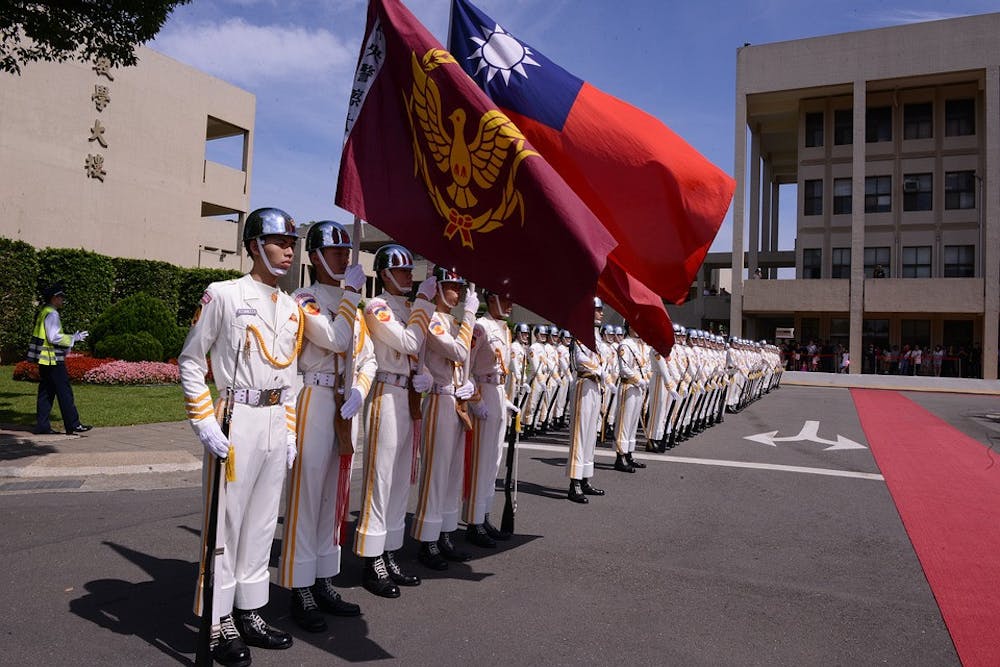The year 2005 was one of the key moments in the history of a tense, sometimes violent standoff between mainland China, which calls itself the People’s Republic of China, and the island of Taiwan, which calls itself the Republic of China. Since the end of the Chinese Civil War and the flight of the defeated Nationalists to Taiwan in 1949, a state of quasi-war has existed across the Taiwan Strait, as both governments vie to be recognized as the true heirs of the government of China. This geopolitical jostling has persisted into the 21st century. In 2005, faced with the possibility that “an inseparable part of China” might indeed separate, the PRC legislature passed the Anti-Secession Law, which for the first time enshrined the legality of using military means to forcibly prevent Taiwanese secession. Tensions rose to a boiling point on both sides of the Strait, and people were preparing for the tangible, real possibility of a sudden outbreak of war.
It was precisely in this context of international conflict that Johnny Lin ’08, then an undergraduate student, decided to take action from where he stood in faraway Providence. If governments refused to talk to each other, he reasoned, why couldn’t youth take up the mantle and advance the conversation between people on both sides of the Strait? And thus, Strait Talk was born, its mission to identify rising young leaders from mainland China, Taiwan and the United States to engage in honest discussions about the Taiwan Strait conflict during a week-long symposium. As organizers of this year’s Strait Talk symposium, held from Oct. 19 to Oct. 26, we were once again reminded that ordinary people, committed to sincere dialogue and sincere introspection, can overcome the tides of history and politics to advance the cause of peace.
The symposium emphasizes sincerity, not just openness; delegates are prompted not only to express their own viewpoints honestly, but also to contend empathetically with competing opinions. And it’s been wildly successful thus far. Since 2005, this project has been conducted at Providence, Berkeley, Hong Kong and Taipei. Constructive dialogue is more possible than the news cycle makes it out to be — and there’s a real demand for it.
To be sure, the events of 2017 — including President Trump’s surprise call with Taiwanese President Tsai Ing-wen — suggest that tensions remain flammable. But though the picture seems bleak now, we know from our past experiences at Strait Talk that cross-Strait relations have made tremendous progress since 2005. Today, unlike during the first symposium, speakers from mainland China or Taiwan have not cancelled last-minute, nor have delegates been threatened by their universities or governments for attending. Indeed, every year, the dialogue between Chinese, Taiwanese and American delegates has become more profound, and the solutions they offer in the final consensus document — which all delegates draft and approve at the end of each symposium — have become increasingly creative and hopeful.
In fact, some of these solutions, developed on paper, have come to fruition. In 2005, delegates floated “idealistic” suggestions about creating opportunities for tourism and educational programs across the Taiwan Strait. Not only are those “idealistic” suggestions a reality today, but tourists crossing the Taiwan Strait average around one-quarter million to half a million a year, and thousands of students now attend universities on opposite sides of the Strait, generating new opportunities for both friction and mutual understanding.
We’ve seen with our own eyes how Strait Talk has impacted young Chinese, Taiwanese and American leaders who attended the symposium, now numbering more than 200 strong. Many of the delegates this year told us that they came to the symposium ready for intense debate, laser-focused on defending their own viewpoint — only to discover that they share many attributes with their purported rivals, most importantly a common humanity. As the world continues to be filled with hate, conflict and oppression, such dialogue is important to all of us.
In the coming years, Strait Talk Brown plans to continue the important work that we do with our annual symposium, and we invite all Brown students to learn more about us and consider joining our team. We also plan to create spaces on campus to learn about the Taiwan Strait issue and to promote engaged dialogue about its history, significance and future. But foremost, we want to share with the Brown community the story of how undergraduate students on this campus created a space for adversaries to earnestly discuss their histories, feelings and dreams. And we look forward to hearing more such stories in the future.
Quinton Huang ’19 and Yang Guo ’18 are the current co-presidents of Strait Talk Brown. They may be reached at quinton_huang@brown.edu and yang_guo@brown.edu. For more information about Strait Talk, visit straittalkbrown.com or on Facebook at facebook.com/StraitTalk.



